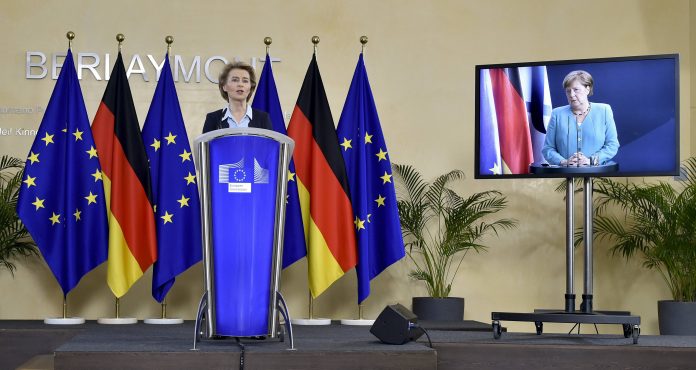
Two of the European Union’s most powerful individuals said Thursday that the 27-nation bloc will continue to discuss human rights and the rule of law with China after Beijing imposed a new security law on Hong Kong.
But Ursula von der Leyen, who heads the EU’s executive commission, and German Chancellor Angela Merkel stopped short of threatening sanctions against China or offering asylum to Hong Kong dissidents, as others in the West have done.
“We will continue to seek dialogue and conversation with China about this,” said Merkel, whose country took over the EU’s rotating six-month presidency this week.
Stressing that ties with China are of “strategic importance” to the European Union, the German leader said it was important to have “a relationship of trust where one can openly say one’s opinions to each other with mutual respect.”
“And there will be differences of opinion, but I hope also common results,” Merkel added.
Asked whether Germany would consider offering asylum to Hong Kong dissidents, the chancellor replied that German asylum law “is there for people everywhere.”
“That means, I don’t currently see that we need to do anything beyond that,” she said.
European Commission President Von der Leyen, whose arm of the EU represents the entire bloc in trade talks with Beijing, said it was in both sides’ interests to maintain the special status of Hong Kong.
“One-sixth of Chinese exports of goods go to Europe, and China sells goods worth 320 billion euros ($359 billion) to Europe alone every year,” she told reporters in Brussels and Berlin.
“Hong Kong is still the most important hub for China’s economic exchange with Europe, not least because of the city’s (…) special status and the stability and the cosmopolitanism that this city has,” von der Leyen said. “Both sides should have a strong interest in ensuring that this level of cooperation at least continues.”
She added that “if Europe takes a confident and takes a united position, it will have a long-term effect on China.”
The Chinese government has lashed out at what it considers foreign meddling in Hong Kong’s affairs, after the U.S. House of Representatives on Wednesday joined the Senate in rebuking China over its crackdown in Hong Kong by approving a bill to impose sanctions on groups that undermine the city’s autonomy or restrict freedoms promised to its residents.



















